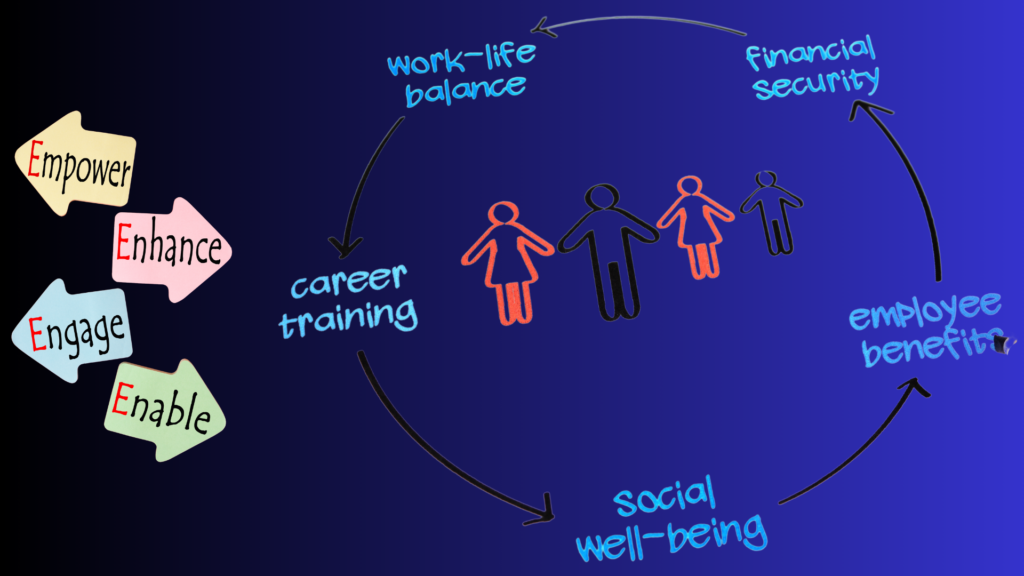
Employee engagement is often talked about in HR circles, but it’s more than just a buzzword. It’s the secret ingredient that can transform an organization’s workforce into a powerhouse of productivity, innovation, and loyalty. When employees are engaged, they don’t just perform their duties—they become ambassadors of your brand, contributing to a culture that drives business success. But how do you connect the dots between employee engagement and tangible business outcomes? Let’s dive in.
What Is Employee Engagement?
At its core, employee engagement is about emotional investment. Engaged employees care deeply about their work, their teams, and the success of the organization. They feel valued, heard, and motivated. However, engagement isn’t a one-size-fits-all solution—it needs to align with your business objectives to create meaningful impact.
For example, a retail chain with high customer interaction needs employees who are not just skilled but also enthusiastic and empathetic. Their engagement directly influences customer experience, sales, and loyalty.
The Business Case for Engagement
Why does engagement matter so much? Because disengaged employees cost money—through absenteeism, high turnover, and poor performance. Engaged employees, on the other hand, deliver:
- Higher Productivity: Engaged teams are 17% more productive than disengaged ones, as studies have shown.
- Better Retention: Employees who feel valued and connected to their work are less likely to leave.
- Stronger Financial Performance: Companies with high engagement outperform their competitors by 23% in profitability, according to Gallup.
How to Align Engagement with Business Goals
- Start with Clear Objectives
Engagement efforts should align with your company’s overarching goals. What are you trying to achieve? Increased customer satisfaction? Faster project delivery? Better innovation? When engagement activities are tied to measurable business outcomes, the results are easier to track and sustain.Example: A tech startup struggling with high turnover created a feedback-driven culture. They aligned their engagement initiatives—regular pulse surveys, town halls, and reward systems—with their goal of retaining top tech talent. The result? Improved retention and a more collaborative workplace. - Develop Leaders Who Engage
Engagement begins at the top. Leaders and managers are the frontline influencers of workplace culture. Equip them with the tools to inspire, motivate, and connect with their teams. When leaders actively promote shared goals and recognize achievements, employees naturally feel more invested.Example: A mid-sized financial services firm trained managers to have weekly one-on-one check-ins with their teams, focusing on personal and professional goals. This simple shift boosted both engagement and project completion rates. - Incorporate Employee Feedback
Employees are the heart of engagement efforts—why not involve them in the process? Regularly collect feedback through surveys, focus groups, or anonymous platforms. Use this input to create meaningful initiatives that reflect their needs and aspirations. Example: A manufacturing company noticed a dip in engagement among frontline workers. They introduced a feedback app where employees could anonymously share concerns, leading to actionable insights that improved morale and productivity. - Recognize and Reward Contributions
Recognition is a powerful motivator. A well-structured reward program that celebrates employees’ achievements fosters a sense of belonging and accomplishment. Make sure recognition aligns with your business objectives, such as rewarding innovation or exceptional customer service. - Provide Growth Opportunities
Engaged employees want to grow. Invest in training programs, mentoring, and career pathways that help employees see a future with your organization. When employees see their growth aligned with company success, they stay committed and motivated.
The Results of Engagement Done Right
When engagement is aligned with business success, the outcomes are hard to ignore:
- Teams work together with purpose, driving innovation and efficiency.
- Customers notice the difference, leading to higher satisfaction and loyalty.
- Financial performance improves, creating a win-win for both employees and stakeholders.
One example comes from a client we worked with in the hospitality sector. They faced high turnover rates and declining guest satisfaction scores. By implementing a structured engagement program—including leadership coaching, reward systems, and tailored training—they saw a dramatic improvement in both employee retention and guest feedback within six months.
Ready to Transform Your Engagement Strategy?
Aligning employee engagement with business success is not just a strategy—it’s a mindset. At Haimi Growth Advisors, we specialize in creating customized engagement programs that align with your unique business goals. Whether it’s through leadership training, employee surveys, or tailored engagement initiatives, we ensure your teams are motivated, connected, and ready to deliver results.
Let’s start building your engagement roadmap. Contact us today to learn how we can help you align your people with your purpose—and drive success together.
